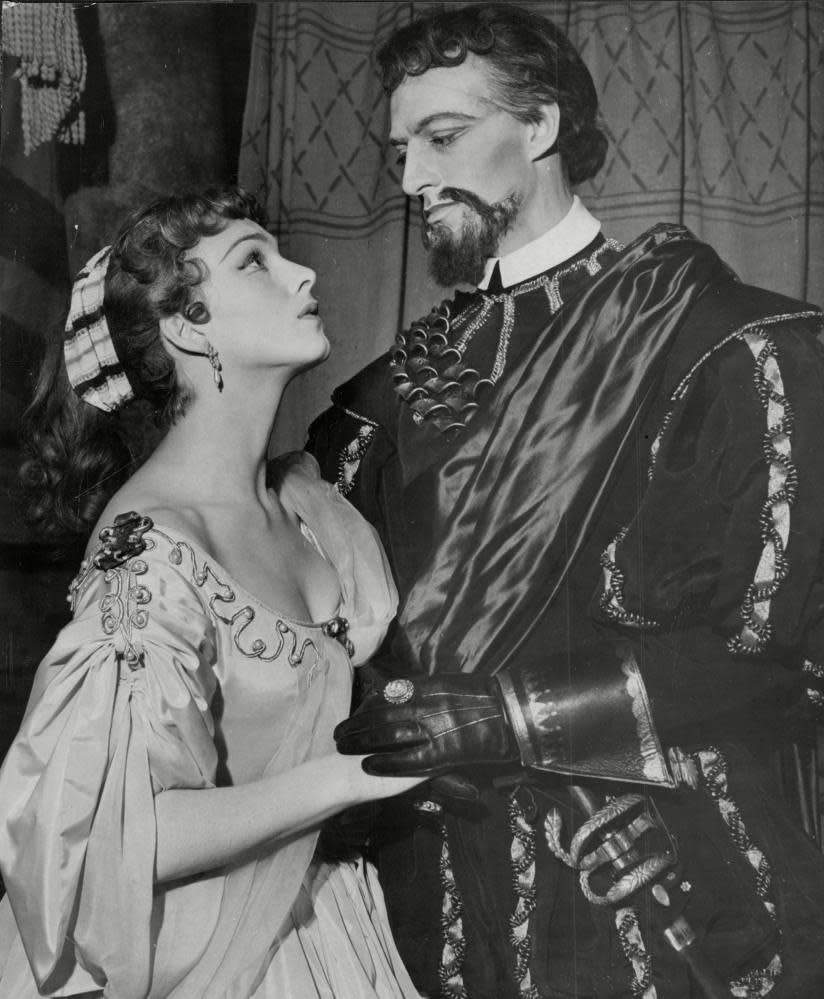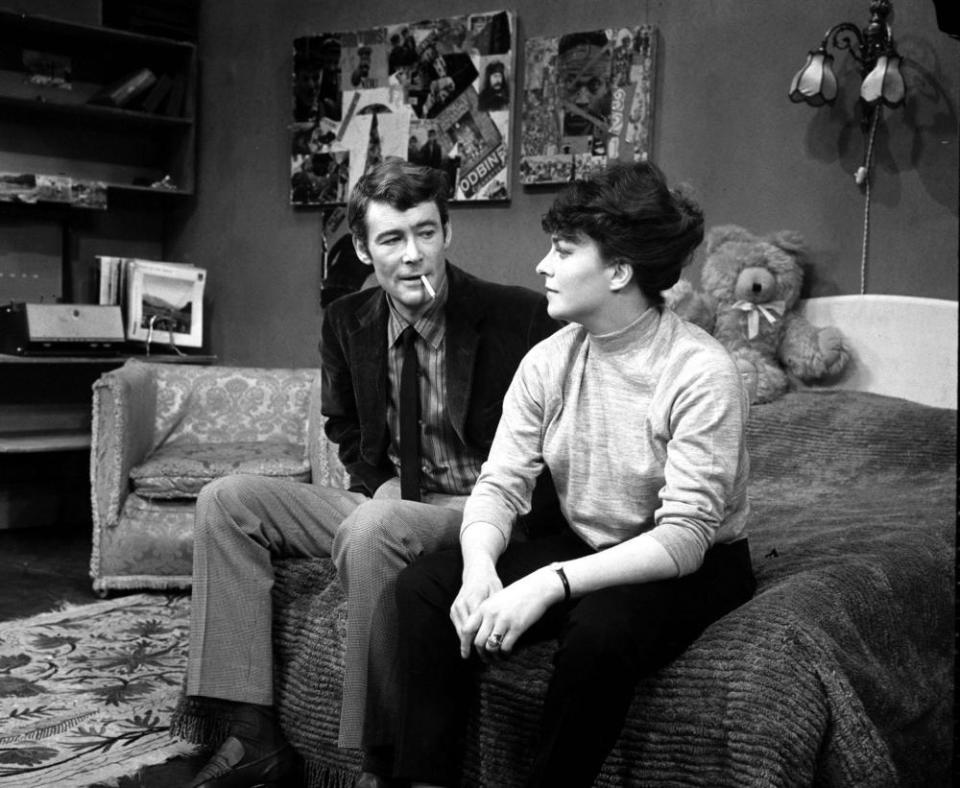Barbara Jefford obituary
The glory days of Barbara Jefford, who has died aged 90, as the leading classical actor of her generation at the Old Vic, came in the 1950s. In that distant decade, she played every Shakespearean female role going, from Imogen and Portia to Beatrice, Rosalind and Desdemona. It was reckoned that she appeared in all but four of his three dozen plays.
She made her name as Isabella in Peter Brook’s 1950 staging of Measure for Measure – rarely done in those days – at Stratford-upon-Avon. Brook wanted an unknown to play the virginal novice opposite John Gielgud’s Angelo. And he asked her, as she knelt before the Duke to plead pardon for Angelo, whom she had “bed-tricked” in order to save her condemned brother, to hold a pause for as long as the audience would allow. Two minutes is an eternity of silence, and that’s what she sometimes commanded.
Few actors exude such intensity and stillness on a stage as was Jefford’s stock-in-trade. She was thought to be a definitive Viola in Twelfth Night in 1958 – bursting with joyful exuberance – but in that same Old Vic season she played Regan in King Lear, and a “fire-breathing” (said Kenneth Tynan) Queen Margaret in Henry VI.
As she matured, she acquired a majesty and a grandeur that most critical writing about her performances noted, as she blazingly personified Tamora, Queen of the Goths, in Titus Andronicus and was the most possessed Saint Joan since Sybil Thorndike’s introduction of the role in 1924, throughout the UK and on tour in Russia at the start of the 60s.

She was not involved in the early days of the Royal Shakespeare Company and the National Theatre, partly because she had played all the great roles open to her before they were launched, but a new London audience discovered her matchless power and dignity when she took over as Gertrude from Angela Lansbury to Albert Finney’s Hamlet at the National in 1975 and partnered him, too, as Zabina in Peter Hall’s magnificent 1976 revival of Marlowe’s Tamburlaine.
At this time, though, she began to feel out of step with current trends and fashions in theatre: “There isn’t the same eagerness to go straight for things, to offer an interpretation of a classic that is bold, straightforward, even obvious … you can only play Shakespeare when you have reached a certain stage of technical expertise. So often you will see very young actors who look divine. Then they open their little traps. You think, oh dear.”
Jefford was born in Plymstock, near Plymouth, in Devon, the daughter of Percival Jefford, a bank manager, and his wife, Elizabeth (nee Laity). She was educated at Weirfield school, Taunton, where she excelled in verse-speaking competitions before being taught elocution by Eileen Hartley at her studio in Bristol. “Whenever I do poems in recitals,” said Jefford, “I can still hear her advice, her instructions, her orders.” She then trained at Rada in London, where she won the Bancroft gold medal.
Her London debut came at the Q theatre in a stage version of Ingmar Bergman’s Frenzy in which she played the Mai Zetterling role (“I wore a plastic mac to show I was a prostitute”). She played three more seasons at Stratford: she was the Queen of France to Richard Burton’s break-out Henry V in 1951 and toured with Anthony Quayle’s company to Australia and New Zealand in 1953-54 as Desdemona, Rosalind, and Lady Percy in Henry IV.
After Andromache opposite Michael Redgrave in Jean Giraudoux’s Tiger at the Gates (translated by Christopher Fry) at the Apollo in 1955, she began a five-year stint at the Old Vic, ending with Lavinia (“superbly suggesting rats at work beneath a smooth white surface,” said one critic) in Eugene O’Neill’s Mourning Becomes Electra in 1961 and a US tour as Lady Macbeth, as well as Saint Joan.

She formed a fruitful working relationship with Frank Hauser, director of the Oxford Playhouse in the 60s, for whom she played Lina Szczepanowska in Shaw’s Misalliance, Dora Doulebov in Camus’s The Just, Cleopatra, Racine’s Phèdre and Irma in Jean Genet’s The Balcony. She returned to the West End in 1963 to open the new May Fair theatre with Ralph Richardson in Pirandello’s Six Characters in Search of an Author and in David Mercer’s Ride a Cock Horse (1965) at the Piccadilly, co-starring Peter O’Toole, Wendy Craig and Siân Phillips in a red raw comedy of an insecure writer, his wife and two mistresses.
She toured extensively abroad in a recital programme, The Labours of Love, with her second husband, the actor John Turner, who was also Antony to her Cleopatra in Dryden’s All For Love, a glittering 1977 production at the Old Vic, again directed by Hauser, in which she miraculously combined a fish-wife swagger with a noble jaw in an unjustly forgotten classic.
When Hall launched several autonomous companies at the National in 1986, she joined the group led by the director Michael Rudman to play the mother in Six Characters (she had been the step-daughter at the May Fair), stoically bereaved and eloquently granite-faced, and made a rare sortie into contemporary drama as a mine owner in male attire in Nick Darke’s Ting Tang Mine. Rudman’s company included two new faces – Ralph Fiennes and Lesley Sharp – as well as Richard Pasco, Alec McCowen and Robin Bailey, and they all shone in Brian Friel’s Fathers and Sons, adapted from Turgenev. She then obligingly repeated her Duchess of York and Queen Margaret for a 1988-89 season at the Phoenix starring Derek Jacobi as both Richard II and Richard III, directed by Clifford Williams, but this was old-style Old Vic, dated and dusty.
Ten years later, in 1998, she joined a far more exciting West End season at the Albery (now the Noël Coward) for Jonathan Kent’s double-header of Racine, playing Oenone, a confidante of steel and ice, to Diana Rigg’s Phèdre (translated by Ted Hughes), and Albina in Britannicus, with Toby Stephens as a livid, unpredictable young Nero on the rise. She re-joined Kent in an Almeida theatre season at the Gainsborough Studios in 2000, once again as the Duchess of York, and as Volumnia, to Fiennes’s tremendous double of Richard II and Coriolanus.

There was a final rerun of Queen Margaret for Kenneth Branagh’s Richard III at the Sheffield Crucible in 2002, a Simon Gray play, The Old Masters, with Edward Fox and Peter Bowles, at the Comedy in 2004 and a magisterial valedictory as Mrs Higgins at the Theatre Royal, Bath, and the Old Vic, in Hall’s superb 2007 revival of Shaw’s Pygmalion, with Tim Pigott-Smith and Michelle Dockery.
Her most memorable film performance was her erotically supercharged Molly Bloom in Joseph Strick’s Ulysses (1967), and she “dubbed” no fewer than three female James Bond actors, Daniela Bianchi in From Russia With Love (1963), Molly Peters in Thunderball (1965) and Caroline Munro in The Spy Who Loved Me (1977). She adorned Roman Polanski’s The Ninth Gate (1999), Terence Davies’s The Deep Blue Sea (2011) and Stephen Frears’s Philomena (2013).
On television, she was a charity worker in Ted Kotcheff’s Edna, the Inebriate Woman (1971) starring Patricia Hayes, Ian McKellen’s mother in Walter (1982), the first drama on Channel 4, directed by Frears, and Ian Richardson’s wife, first lady of the college, in the TV adaptation of Tom Sharpe’s Porterhouse Blue (1987).
When Jefford was appointed OBE in 1965, she was at that time the youngest ever recipient of the honour.
Her first marriage, to the actor Terence Longdon, ended in divorce. She married Turner, who survives her, in 1967.
• Barbara Mary Jefford, actor, born 26 July 1930; died 12 September 2020


